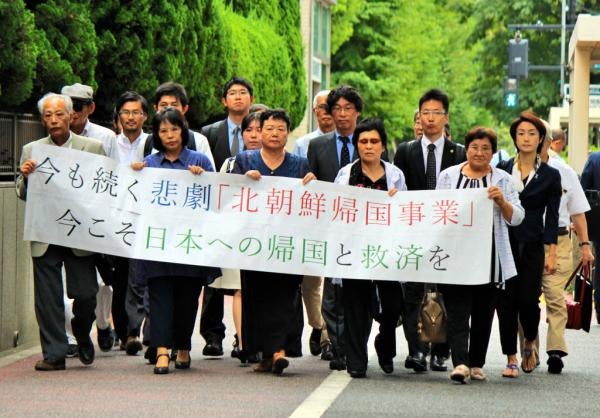Lire la version en français
They were promised “Paradise on Earth.” What they got was raw brutality.
Yesterday, some survivors saw justice.
Between 1959 and 1984, some 93,000 ethnic Koreans and Japanese migrated from Japan to North Korea under a resettlement program pitching North Korea as “Paradise on Earth.” The government in Pyongyang, mostly working through a pliant association of Korean residents in Japan, offered “anything needed for life including housing, food, clothes are fully guaranteed.”
What people found when they got there, of course, was not “paradise” at all, but a desperately poor country, where government repression touched all aspects of daily life. The North Korean government told them where to live, study and work. They told them what to say and how to say it. They rationed their food. They forced them to spy on those around them and report back.
If you’re arm-chairing all this and thinking, “well, they should have known not to go to North Korea,” then maybe think again.
Consider people like Kawasaki Eiko, a second-generation ethnic Korean, who grew up in economically devastated post-war Japan, surrounded by the widespread discrimination ethnic Koreans have historically faced there. The promise of a better life elsewhere would naturally have some pull with her. It was 1960 when she decided to go to North Korea. She was only 17 years old.
And it wasn’t just the North Korean government pushing the “Paradise on Earth” resettlement campaign either.
Japan’s government endorsed the program at the highest level through a cabinet resolution. The Korean residents’ association in Japan carried it out with support from the Japanese and North Korean Red Cross Societies and facilitation by the International Committee of the Red Cross.
Given all that, it’s hardly a surprise that folks like Kawasaki Eiko – some 93,000 of them – took a chance on resettling and only discovered what a terrible decision they’d made when it was too late. She spent 43 years in the “paradise” of North Korean hell, only escaping 2003.
Fast forward to yesterday when the Tokyo High Court made a historic ruling to hold the North Korean government accountable for human rights violations against the victims of the “Paradise on Earth” campaign.
Overturning an earlier decision, the high court ruled Japanese courts had jurisdiction over this case and found the North Korean government had violated the rights of the plaintiffs, survivors of the horror, who included Kawasaki Eiko, now 81.
The high court said plaintiffs were made to live a miserable and tragic existence in North Korea, essentially losing their entire lives as a result of the North Korean government’s infringement on the plaintiffs’ freedom to choose where they live.
The case now moves on to the Tokyo district court, which will primarily review how much the North Korean government should pay the plaintiffs. Even if Pyongyang ultimately refuses to pay up for the damage it caused, what happened yesterday is a huge win for survivors and all North Korean escapees in Japan, who have been fighting in the courts for years.
Outside the Tokyo court yesterday, Kawasaki Eiko “wiped her tears and raised her fists in victory.” Some justice, at long last.








